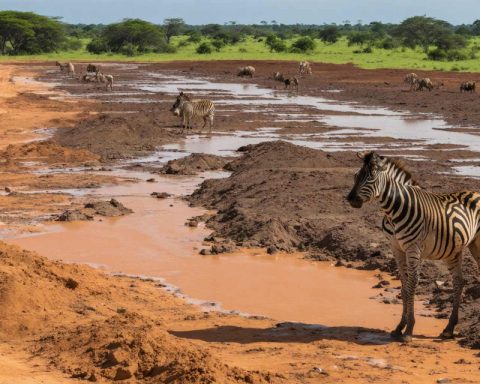The Great Barrier Reef is facing alarming devastation as scientists report significant damage caused by a recent marine heatwave. This event has led to what experts term as “catastrophic” impacts on one of the world’s most treasured ecosystems.
Recent assessments reveal that large sections of the reef’s coral have been severely affected, leading to their destruction. The intense heat has further exacerbated ongoing challenges for the reef, which is already vulnerable due to climate change and pollution. The loss of these corals not only threatens the rich biodiversity of the reef but also the communities that depend on it for their livelihoods.
The situation draws urgent attention to the broader implications of rising ocean temperatures, highlighting an ecological crisis that may spell disaster for marine life. Scientists are stressing the need for immediate action to mitigate these adverse effects and protect the delicate balance of the reef.
Losing iconic corals not only affects marine habitats but also the tourism industry that relies on the reef’s beauty. Without concerted efforts to tackle the underlying causes of climate change, the future of the Great Barrier Reef remains uncertain. Advocates are calling for increased awareness and intervention to safeguard this UNESCO World Heritage Site for future generations.
The Ripple Effects of Coral Loss: Society, Economy, and Environment at a Crossroads
The ongoing degradation of the Great Barrier Reef is not merely an isolated ecological concern; it reverberates through multiple facets of society and the global economy. As the coral ecosystems decline, vulnerable coastal communities face significant economic disruptions. Many locals depend on the reef for fishing, tourism, and recreation, industries that collectively contribute billions to the Australian economy. A decline in coral health inevitably results in reduced biodiversity, hampering the resilience of the reef’s marine life and the services these ecosystems provide, such as natural coastal protection against storms.
Moreover, the repercussions extend beyond Australia. Tourism tied to the Great Barrier Reef attracts millions of international visitors, influencing global travel patterns and economies. As the reefs degrade, potential visitors may seek alternative destinations, causing a domino effect of economic loss in regions that depend heavily on ecotourism.
In terms of environmental impact, the loss of coral will contribute to a broader climate crisis. Coral reefs act as crucial carbon sinks, and their destruction will hinder efforts to mitigate climate change. Future trends suggest that without immediate and effective action, we may witness the complete collapse of reef systems worldwide, an alarming reality that could signal a decline in marine biodiversity and the collapse of global fish stocks.
The urgency to rectify this situation cannot be overstated; the long-term survival of both marine ecosystems and the livelihoods they support hangs in the balance. Meeting this challenge requires collective global action, innovative policies, and a commitment to sustainability, assuring that future generations inherit a thriving natural world.
The Great Barrier Reef: A Call to Action Amidst Catastrophic Damage
Introduction
The Great Barrier Reef, one of the planet’s most remarkable ecosystems, is currently facing unprecedented threats following a recent marine heatwave. Scientists have reported catastrophic impacts to vast coral sections, raising alarms about the future of this UNESCO World Heritage Site and the communities that rely on it. This article explores the extent of the damage, its implications, and the urgent need for action.
The Current State of the Reef
Recent evaluations indicate that significant portions of coral within the Great Barrier Reef have suffered severe damage. Marine heatwaves, exacerbated by climate change, have led to mass bleaching events that compromise the integrity of these corals. With corals being the foundational species of this ecosystem, their loss poses dire consequences not just for marine life, but also for human communities that depend on the reef’s resources.
Implications of Coral Loss
The destruction of coral systems is alarming for several reasons:
– Biodiversity Loss: The Great Barrier Reef supports thousands of marine creatures, including fish, mollusks, and sea turtles. Coral reefs provide critical habitats and nurseries for many of these species.
– Economic Impact: Many coastal communities depend on the reef for tourism, fishing, and related industries. The decline of the reef could lead to significant economic downturns in regions dependent on these activities.
– Ecosystem Services: Coral reefs play essential roles in protecting coastlines, providing food, and maintaining water quality. The loss of these services can have cascading effects on both marine and terrestrial ecosystems.
Urgent Call for Action
Experts emphasize the necessity for immediate and sustained intervention to mitigate the crisis facing the Great Barrier Reef. Suggested actions include:
– Strengthening Policies on Climate Change: Governments at both local and national levels must adopt and enforce policies aimed at reducing greenhouse gas emissions.
– Pollution Management: Improving water quality by reducing runoff from agriculture and urban areas is crucial for restoring the health of the reef.
– Community Engagement: Raising awareness and involving local communities in conservation efforts can foster a sense of stewardship and responsibility towards the reef.
Pros and Cons of Current Conservation Efforts
Pros:
– Enhanced research-backed initiatives to understand and combat coral bleaching.
– Increased funding for rehabilitation and restoration projects.
– Greater awareness and activism surrounding climate change and marine conservation.
Cons:
– Slow governmental response to ongoing environmental degradation.
– Limited resources hinder the effectiveness of restoration programs.
– Geographic limitations restrict the reach of current conservation measures.
Conclusion
As the Great Barrier Reef continues to face unprecedented challenges, the need for immediate action is more critical than ever. Without significant efforts to combat climate change and pollution, the future of the reef—and the countless species and communities that depend on it—remains in jeopardy.
For more information on marine conservation and the impact of climate change, visit World Wildlife Fund.







